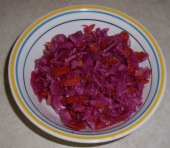I've started exploring lacto-fermentation, but I'm quickly running out of fridge space to keep the end result from over-fermenting once it's done.
I'd like to explore canning to make some of my fermentations shelf-stable (at the cost of some probiotics and texture, I know.). I've found clear information for sauerkraut from a reputable source (
https://extension.psu.edu/lets-preserve-sauerkraut) but not for things like fermented carrots or mixed vegetables.
Any ideas? Personal experience with that?
I guess, historically, that people had a root cellar or an uninsulated attic to store their fermentations over longer periods of time. But for me, in my current setting, the "long term storage" of ferments is essentially null (It's not like I'm in the habit of losing cabbage or carrots in the fridge. They practically last forever in their natural form.)






